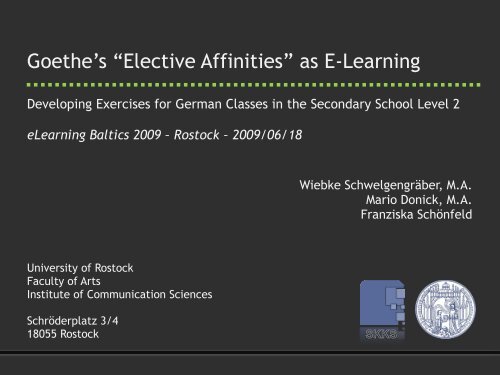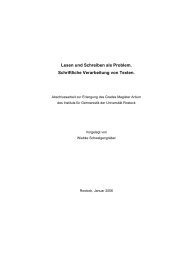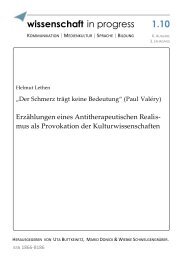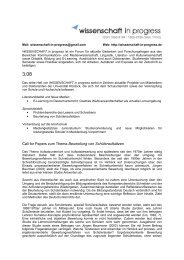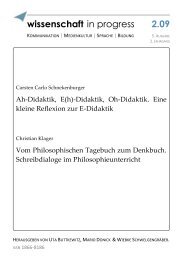Case Study - WISSENSCHAFT in progress
Case Study - WISSENSCHAFT in progress
Case Study - WISSENSCHAFT in progress
Create successful ePaper yourself
Turn your PDF publications into a flip-book with our unique Google optimized e-Paper software.
Goethe’s “Elective Aff<strong>in</strong>ities” as E-Learn<strong>in</strong>g<br />
Develop<strong>in</strong>g Exercises for German Classes <strong>in</strong> the Secondary School Level 2<br />
eLearn<strong>in</strong>g Baltics 2009 – Rostock – 2009/06/18<br />
University of Rostock<br />
Faculty of Arts<br />
Institute of Communication Sciences<br />
Schröderplatz 3/4<br />
18055 Rostock<br />
Wiebke Schwelgengräber, M.A.<br />
Mario Donick, M.A.<br />
Franziska Schönfeld
I<br />
Aims of this Talk<br />
2009/06/18 Develop<strong>in</strong>g Exercises for German Classes <strong>in</strong> the Secondary School Level 2
Aims of this Talk Overview<br />
I Aims of this Talk<br />
II Exercise Development and E-Learn<strong>in</strong>g – Theory & Methods<br />
III <strong>Case</strong> <strong>Study</strong>: Goethe’s “Elective Aff<strong>in</strong>ities” as E-Learn<strong>in</strong>g<br />
IV Conclusion: Generalization and Further Possibilities<br />
2009/06/18 Develop<strong>in</strong>g Exercises for German Classes <strong>in</strong> the Secondary School Level 2
Aims of this Talk Problem<br />
How can we develop exercises for electronic and blended<br />
learn<strong>in</strong>g situations <strong>in</strong> a reflected way?<br />
2009/06/18 Develop<strong>in</strong>g Exercises for German Classes <strong>in</strong> the Secondary School Level 2
Aims of this Talk Ma<strong>in</strong> <strong>Case</strong> <strong>Study</strong><br />
Goethe’s “Elective Aff<strong>in</strong>ities” as Virtual Environment<br />
2009/06/18 Develop<strong>in</strong>g Exercises for German Classes <strong>in</strong> the Secondary School Level 2
II<br />
Exercise Development and E-Learn<strong>in</strong>g –<br />
Theory & Methods<br />
2009/06/18 Develop<strong>in</strong>g Exercises for German Classes <strong>in</strong> the Secondary School Level 2
Theory & Methods Views on Exercise Development<br />
Metadata<br />
Standards<br />
Technical<br />
Question<br />
Standards<br />
Technical<br />
Communication<br />
Standards<br />
Selected<br />
Perspectives<br />
Specialized<br />
Didactics<br />
Conceptual<br />
Psychology<br />
L<strong>in</strong>guistic<br />
Design<br />
e.g. [AGH09, CCB05, Cu08] e.g. [Kö07, Schä06, Fr03, Wi03, JS08]<br />
2009/06/18 Develop<strong>in</strong>g Exercises for German Classes <strong>in</strong> the Secondary School Level 2
Theory & Methods Views on Exercise Development<br />
Metadata<br />
Standards<br />
Technical<br />
Question<br />
Standards<br />
Technical<br />
Communication<br />
Standards<br />
Focused<br />
Perspective<br />
Specialized<br />
Didactics<br />
Conceptual<br />
Psychology<br />
L<strong>in</strong>guistic<br />
Design<br />
e.g. [AGH09, CCB05, Cu08] e.g. [Kö07, Schä06, Fr03, Wi03, JS08]<br />
2009/06/18 Develop<strong>in</strong>g Exercises for German Classes <strong>in</strong> the Secondary School Level 2
Theory & Methods Scientific Embeddedness<br />
Read<strong>in</strong>g & Writ<strong>in</strong>g Process Research<br />
Communication Scientists<br />
L<strong>in</strong>guists<br />
Psychologists<br />
Teachers<br />
Related Projects<br />
PISA study<br />
VERA 6<br />
2009/06/18 Develop<strong>in</strong>g Exercises for German Classes <strong>in</strong> the Secondary School Level 2
Theory & Methods Simplified Competence Model<br />
Dimension/<br />
Step<br />
Enhanced model based on [Kö05]<br />
F<strong>in</strong>d<br />
Information<br />
(textual close 1)<br />
Step 1 Localize explicit<br />
<strong>in</strong>formation<br />
Step 2 Recognize<br />
relations<br />
Step 3 Infer hidden<br />
<strong>in</strong>formation<br />
Interpret <strong>in</strong><br />
relation to text<br />
(textual close 2)<br />
Reflect and<br />
Judge<br />
(textual distant)<br />
Restate ma<strong>in</strong> topic Draw connection<br />
to everyday life<br />
knowledge<br />
Integrate parts of<br />
text<br />
Understand details<br />
of unknown texts<br />
Assess text<br />
properties<br />
Discuss the text<br />
2009/06/18 Develop<strong>in</strong>g Exercises for German Classes <strong>in</strong> the Secondary School Level 2
Theory & Methods Exercise Types<br />
Test Exercises<br />
Reliable<br />
Objective<br />
Valid<br />
Exam Exercises<br />
Learn<strong>in</strong>g Exercises<br />
2009/06/18 Develop<strong>in</strong>g Exercises for German Classes <strong>in</strong> the Secondary School Level 2
Theory & Methods Exercise Designs<br />
Closed<br />
Half-open<br />
Open<br />
Examples This design supports …<br />
multiple choice<br />
right/wrong<br />
match<strong>in</strong>g<br />
cloze texts<br />
tasks that require short<br />
phrases as answer<br />
standardized operators,<br />
such as “<strong>in</strong>terpret”,<br />
“analyze”, “discuss”<br />
etc.<br />
Test Situations<br />
search for <strong>in</strong>formation <strong>in</strong>side or outside the text (ref. to text specific knowledge<br />
vs. general knowledge)<br />
orientation on read<strong>in</strong>g competencies to lower the writ<strong>in</strong>g barrier<br />
motivation of learners: most learners like to solve closed exercises<br />
evaluation of read<strong>in</strong>g achievements both by the teacher and the learner<br />
Exams and Test Situations<br />
applied mixture of read<strong>in</strong>g and writ<strong>in</strong>g competencies<br />
learner’s autonomous <strong>in</strong>terpretation of read texts<br />
evaluation of read<strong>in</strong>g achievements by the teacher<br />
analysis of central topics and coherence <strong>in</strong> parts larger than one sentence<br />
Learn<strong>in</strong>g Situations<br />
open, but topic-related association <strong>in</strong> regard of text<br />
open <strong>in</strong>terpretation of the read text<br />
discussion & development of new topics <strong>in</strong> a group<br />
development & application of <strong>in</strong>dividual read<strong>in</strong>g strategies<br />
embodiment of the text (creative writ<strong>in</strong>g, drama etc.)<br />
learner’s motivation to be allowed to be creative<br />
2009/06/18 Develop<strong>in</strong>g Exercises for German Classes <strong>in</strong> the Secondary School Level 2
Theory & Methods Exercise Designs<br />
Closed<br />
Half-open<br />
Open<br />
Examples This design supports …<br />
multiple choice<br />
right/wrong<br />
match<strong>in</strong>g<br />
cloze texts<br />
tasks that require short<br />
phrases as answer<br />
standardized operators,<br />
such as “<strong>in</strong>terpret”,<br />
“analyze”, “discuss”<br />
etc.<br />
Test Situations<br />
search for <strong>in</strong>formation <strong>in</strong>side or outside the text (ref. to text specific knowledge<br />
vs. general knowledge)<br />
orientation on read<strong>in</strong>g competencies to lower the writ<strong>in</strong>g barrier<br />
motivation of learners: most learners like to solve closed exercises<br />
evaluation of read<strong>in</strong>g achievements both by the teacher and the learner<br />
Exams and Test Situations<br />
applied mixture of read<strong>in</strong>g and writ<strong>in</strong>g competencies<br />
learner’s autonomous <strong>in</strong>terpretation of read texts<br />
evaluation of read<strong>in</strong>g achievements by the teacher<br />
analysis of central topics and coherence <strong>in</strong> parts larger than one sentence<br />
Learn<strong>in</strong>g Situations<br />
open, but topic-related association <strong>in</strong> regard of text<br />
open <strong>in</strong>terpretation of the read text<br />
discussion & development of new topics <strong>in</strong> a group<br />
development & application of <strong>in</strong>dividual read<strong>in</strong>g strategies<br />
embodiment of the text (creative writ<strong>in</strong>g, drama etc.)<br />
learner’s motivation to be allowed to be creative<br />
2009/06/18 Develop<strong>in</strong>g Exercises for German Classes <strong>in</strong> the Secondary School Level 2
III<br />
<strong>Case</strong> <strong>Study</strong>:<br />
Goethe’s “Elective Aff<strong>in</strong>ities” as E-Learn<strong>in</strong>g<br />
2009/06/18 Develop<strong>in</strong>g Exercises for German Classes <strong>in</strong> the Secondary School Level 2
<strong>Case</strong> <strong>Study</strong> Goal<br />
To provide pupils <strong>in</strong> German classes <strong>in</strong> the Secondary<br />
School Level 2 additional <strong>in</strong>teractive perspectives on the<br />
novel “Elective Aff<strong>in</strong>ities” by J. W. Goethe<br />
2009/06/18 Develop<strong>in</strong>g Exercises for German Classes <strong>in</strong> the Secondary School Level 2
<strong>Case</strong> <strong>Study</strong> Overview<br />
Technical Concept<br />
Text-based virtual environment<br />
Realization as Interactive Fiction (IF)<br />
Implementation us<strong>in</strong>g Inform 7 with GerX Extension<br />
2009/06/18 Develop<strong>in</strong>g Exercises for German Classes <strong>in</strong> the Secondary School Level 2
<strong>Case</strong> <strong>Study</strong> Overview<br />
Inform 7<br />
Natural language<br />
(although very<br />
“Denglisch” with GerX)<br />
Usable without<br />
programm<strong>in</strong>g knowledge<br />
Preprocessor; creates Cstyle<br />
Inform 6 code<br />
More <strong>in</strong>fo: <strong>in</strong>form7.com<br />
2009/06/18 Develop<strong>in</strong>g Exercises for German Classes <strong>in</strong> the Secondary School Level 2
<strong>Case</strong> <strong>Study</strong> Overview<br />
Advantages<br />
IF valuable for classes <strong>in</strong> which read<strong>in</strong>g and writ<strong>in</strong>g<br />
texts are <strong>in</strong> the center of <strong>in</strong>terest<br />
Orig<strong>in</strong>al text forms the core of the virtual world<br />
Users need no special technical requirements<br />
IF facilitates voluntary development<br />
2009/06/18 Develop<strong>in</strong>g Exercises for German Classes <strong>in</strong> the Secondary School Level 2
<strong>Case</strong> <strong>Study</strong> Overview<br />
Text <strong>in</strong>ternal Topics (from Goethe’s Novel)<br />
Marriage and Society<br />
Architecture and Design<br />
Sciences<br />
Arts and Education<br />
2009/06/18 Develop<strong>in</strong>g Exercises for German Classes <strong>in</strong> the Secondary School Level 2
<strong>Case</strong> <strong>Study</strong> Overview<br />
Text external Topics (Related to Goethe’s Novel)<br />
Fall of the Holy Roman Empire<br />
Development of a Civil Society<br />
The “Demoniac”<br />
Romanticism and Anti-Romanticism<br />
2009/06/18 Develop<strong>in</strong>g Exercises for German Classes <strong>in</strong> the Secondary School Level 2
<strong>Case</strong> <strong>Study</strong> Some Sketches (Spr<strong>in</strong>g 2008)<br />
Basic World Structure<br />
Two Rooms<br />
Implemented Places<br />
2009/06/18 Develop<strong>in</strong>g Exercises for German Classes <strong>in</strong> the Secondary School Level 2
<strong>Case</strong> <strong>Study</strong> Screenshot of current Alpha<br />
2009/06/18 Develop<strong>in</strong>g Exercises for German Classes <strong>in</strong> the Secondary School Level 2
<strong>Case</strong> <strong>Study</strong> Screenshot of current Alpha<br />
Decontextualisation of orig<strong>in</strong>al text<br />
objects<br />
complex read<strong>in</strong>g situation<br />
Competencies for successful Re-<br />
Contextualisiation:<br />
Textual close 1 and 2, steps 2 and 3<br />
2009/06/18 Develop<strong>in</strong>g Exercises for German Classes <strong>in</strong> the Secondary School Level 2
<strong>Case</strong> <strong>Study</strong> How to develop an Exercise – Example<br />
The Intuitive Way<br />
“This is an <strong>in</strong>ternal topic, thus it<br />
addresses read<strong>in</strong>g comprehension.”<br />
“The Pupil should use the orig<strong>in</strong>al<br />
novel to solve the exercise.”<br />
“How could I verbalize the exercise?”<br />
“I don’t want to assess the pupil.”<br />
“It should cover Goethe’s way to<br />
reflect on the topics marriage and<br />
society.”<br />
2009/06/18 Develop<strong>in</strong>g Exercises for German Classes <strong>in</strong> the Secondary School Level 2
<strong>Case</strong> <strong>Study</strong> How to Develop an Exercise – Example<br />
The Structured Way<br />
2009/06/18 Develop<strong>in</strong>g Exercises for German Classes <strong>in</strong> the Secondary School Level 2
<strong>Case</strong> <strong>Study</strong> How to Develop an Exercise – Example<br />
„Überprüfe, wer diesen Brief verfasst<br />
hat und an wen er adressiert ist. Dazu<br />
kannst du die anwesenden Personen<br />
befragen und überprüfen, welche<br />
Gegenstände <strong>in</strong> diesem Raum dir<br />
Informationen liefern könnten.“<br />
“Check who has written this letter and who the letter’s adressee<br />
is. You can <strong>in</strong>terview the persons and check the items <strong>in</strong> this<br />
room for <strong>in</strong>formation.”<br />
2009/06/18 Develop<strong>in</strong>g Exercises for German Classes <strong>in</strong> the Secondary School Level 2
IV<br />
Conclusion:<br />
Generalization and Further Possibilities<br />
2009/06/18 Develop<strong>in</strong>g Exercises for German Classes <strong>in</strong> the Secondary School Level 2
Conclusion Further Possibilities<br />
… by a tutor <strong>in</strong><br />
a LMS<br />
… by a teacher<br />
<strong>in</strong> relation to elearn<strong>in</strong>g<br />
media<br />
Exercise<br />
offered …<br />
… <strong>in</strong> an offl<strong>in</strong>e<br />
e-learn<strong>in</strong>g<br />
medium<br />
Although different fields require different competence<br />
models, the structured algorithm proves very helpful.<br />
2009/06/18 Develop<strong>in</strong>g Exercises for German Classes <strong>in</strong> the Secondary School Level 2<br />
…
Conclusion<br />
Develop<strong>in</strong>g exercises is an <strong>in</strong>tense process.<br />
Research on exercise development offers structured ways to<br />
sharpen the formely <strong>in</strong>tuitive development process.<br />
2009/06/18 Develop<strong>in</strong>g Exercises for German Classes <strong>in</strong> the Secondary School Level 2
Thank you for your <strong>in</strong>terest!<br />
Questions?<br />
Remarks?<br />
2009/06/18 Develop<strong>in</strong>g Exercises for German Classes <strong>in</strong> the Secondary School Level 2
Contact<br />
University of Rostock<br />
Faculty of Arts<br />
Institute of Communication Sciences<br />
Schröderplatz 3/4<br />
D-18055 Rostock<br />
http://www.phf.uni-rostock.de/komm<br />
Wiebke Schwelgengräber, M.A.<br />
Mario Donick, M.A.<br />
Franziska Schönfeld<br />
firstname.lastname@uni-rostock.de


